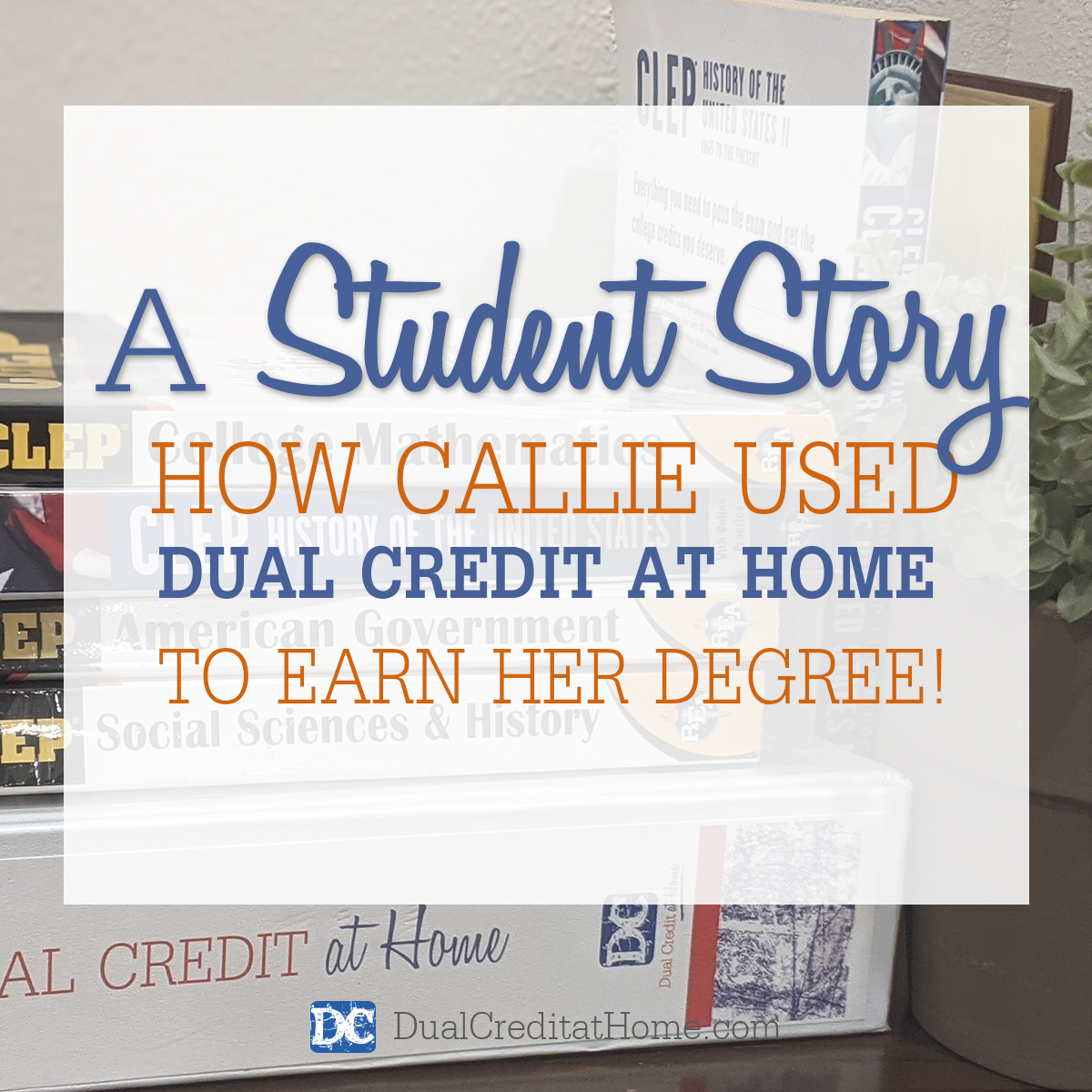“During these unprecedented times…”
In the college scene, these words are still spot-on, even though we’re all tired of hearing them. We’ve never gone through anything like COVID-19 before in the history of education, alternative education, homeschooling, or anything else. Nobody knows what to do because they’ve never done this before.

But while the world of academia adjusts and restructures, high school students keep right on making great progress toward their college degrees!
Here are a few tips to keep you moving towards college credit during “these unprecedented times.”
Perhaps the main factor students should consider is the incoming credit policy of their chosen college. Understanding their personal degree plan equips a student to accumulate only the credits they will use and avoid credits that have no place in that degree plan.
A favorite method of earning college credit is self-teaching at home and then passing an accredited college-level exam to show they’ve learned the course content. Yes, it’s that easy!
CLEP and DSST exams are often favorites for several reasons. Number one being that these two exam programs are the most widely accepted methods of earning college credit outside of the classroom – accepted more easily and at more colleges and universities than any other form of non-traditional credit.
CLEP and DSST exams are perhaps the easiest to prepare for and to take. One benefit to preparing for a CLEP or DSST exam is that parents and students choose their own test prep materials and design their own “course” or schedule of preparation.
Students may move through the material as quickly as they like, and they can supplement with as many additional resources as they like – videos, biographies, field trips, additional texts, etc.
Of course, many students like to move quickly through the material in order to take the official exam and move on to the next subject – after all, their goal is to accelerate their degree and not spend the national average of 6.5 years earning their four-year degree.
While some colleges and universities temporarily suspended their testing services, many of them are once again offering those services. Also, private companies are more likely than universities to be open for testing.
DUAL CREDIT AT HOME
Since not every parent wants to prepare their own course of study for their teen or even knows which exams are necessary or which order is best to follow, they might consider the Dual Credit at Home program. There you’ll find actual degree plans and daily study plans to follow as your student completes their bachelor’s degrees during or soon after high school.
Dual Credit at Home provides Study Plans – daily lesson plans – for the specific 13 CLEP and DSST exams that satisfy the general education requirements (aka “core” subjects or “the basics”) at Charter Oak State College and Thomas Edison State University, which are two of the top regionally accredited online schools.
High school level textbooks, typically from a Christian worldview including BJUP and Apologia, have been chosen for students to use as they prepare for the exams.
Parents and students are invited to be a part of the private Dual Credit at Home community on Facebook where families ask and answer questions, share success stories, and encourage each other as they homeschool high school while completing college requirements.
Dual Credit at Home has a free video course, The College Degree Roadmap, that explains the process of earning a college degree during high school using non-traditional credit-earning opportunities available to everyone. Here is a list of everything included in this program.
CollegeBoard’s AP exams are another option. One drawback to AP exams is that they are offered only one day per year and must be coordinated with a local school district. AP courses can be more expensive than other methods of preparing for a credit-bearing exam and must be pre-approved by CollegeBoard to be given the designation “AP” on a student’s high school transcript.
MODERN STATES
Another option for earning college credit during this time is Modern States, a philanthropic organization formed to increase access to higher education for those who might find it otherwise out of their reach because of the high cost of tuition or other factors.
Some parents say Modern States’ courses are not adequate in and of themselves to prepare students to pass the official college-level exam. One parent had one of her teens complete a Modern States course AFTER she had completed her Dual Credit at Home Study Plan as a review and to receive the voucher, mainly because she wanted to see this process work successfully from start to finish. It wasn’t a “true” comparison test because they did not rely on the Modern States course to prepare her for the CLEP exam. She knew from experience that the Dual Credit at Home Study Plan was adequate and she preferred her choice of textbooks and worldview, and she was not confident of Modern States’ ability to prepare her to pass.
Modern States courses are designed to prepare students for CLEP exams or AP exams. Textbooks and materials are provided within the course, but parents and students have no control over course content.
Here’s how it works…you sign up for a Modern States account and enroll in their free course. After you complete all of the course work and practice questions, you may request a voucher for the cost of your CLEP exam. Then you purchase the CLEP exam on CollegeBoard’s website, use the voucher code as payment, and make an appointment with a local testing center to take the actual exam.
Modern States is recommended as a method of review for a CLEP exam, and the voucher covering the cost of the CLEP exam brings the overall cost of a degree even lower.
STUDY.COM
Some students choose to earn some of their credits through Study.com who has created actual courses and had them reviewed by ACE and recommended for college credit.
It’s a benefit that no books or third party subscriptions are needed because all course content is included in your subscription price. At the same time, it is a drawback that parents have no control over course content or the worldview in which it is presented to high school students.
College Accelerator is the plan within Study.com that students must subscribe to in order to take courses that have been approved for college credit. Not all colleges accept credits from Study.com, so find out in advance if Study.com credits will be accepted at your chosen college. Over 220 Study.com courses have been approved by ACE and NCCRS for college credit, but to be necessary credit, the course must have a specific place in your particular degree plan.
Not all Study.com courses have been approved for college credit but might still be considered by a homeschool parent for a high school course only.
With a $200/month subscription to the College Accelerator plan, students may take as many courses per month as they like but may only take two proctored exams per month. However, for an additional $70 per exam, a student may take up to 3 more exams per month.
One parent used Study.com in their homeschool this past spring during the time testing centers were temporarily closed due to the pandemic. One of her daughters was only six upper-level credits away from college graduation, so she purchased one month of the College Accelerator plan, and the student took two upper level courses in order to graduate in May.
https://study.com/college/faq.html
LUMERIT
Lumerit, formerly College Plus/Unbound, primarily serves students that have already graduated from high school and want to enjoy a flexible schedule while earning their college degree – not tied down to a campus or a particular class schedule. However, some high school students have participated in their program as well.
Lumerit is currently being rebranded to “Pearson Accelerated Pathways.” It is an expensive option with a cost of $5400 per year to complete 8 courses and $7500 per year to complete an unlimited number of courses within that year. Lumerit staff will compile a personal plan for you consisting of courses from various schools. They have sample plans on their website.
Lumerit has designed several of their own courses which have been approved by ACE for college credit. You may contact Lumerit for individual, custom pricing on their courses. However, many of their courses are also available in other less-expensive forms (CLEP, etc.).
SOPHIA
Sophia is another online course provider whose courses have been reviewed by ACE and also recommended for college credit.
For a $79 per month subscription, students may have two active courses at one time. Once a course is successfully completed, college credit can be transferred through ACE to a college that accepts Sophia credit. Unlike exams, successful completion of the SOPHIA course earns college credit – without the need to take a one-time pass/fail exam.
Sophia courses are built around Challenges and Milestones that must each be completed and passed in order. Their courses are self-paced, and since study materials are built into the course, parents do not have control of either the course content or the study materials given to their teens.
STRAIGHTERLINE
Straighterline is another online course provider from which students can take courses for college credit and have those credits applied to their degree plan with a college or university that accepts StraighterLine credit.
For a $99 monthly membership fee, with an additional charge per course starting at $59 each, they have over 60 online courses that have been approved for college credit by ACE.
Again, college credit is only transferable to colleges that have an agreement with StraighterLine. Students may take unlimited courses per month, and StraighterLine offers two free lessons from several of their courses to help students get a feel for what a course is like.
https://www.straighterline.com/faq/
https://www.straighterline.com/landing/take-free-trial-course-cnt/
SAYLOR ACADEMY
And lastly you might consider Saylor Academy, an online initiative that offers online open courses that students can complete at their pace, on their schedule, and free of cost.
There is a $25 Proctor fee per Direct Exam plus a transcript transfer cost, but their courses are free. For each course you want to transfer, you must pass the Saylor Direct Credit Final Exam under the supervision of a proctor. You do not have to take the course in order to take the exam, though it is recommended. Credit can only be transferred to colleges that partner with Saylor.
Once again, parents do not have control over course content or the worldview from which it is presented.
If your teen is serious about earning a college degree without student loans, help them consider regionally accredited colleges and universities that offer students credit earning flexibility. The top three to consider are Charter Oak State College, Thomas Edison State University, and Excelsior. Since high school and college courses have so much overlap, it is smart to earn both the high school credit and the college credit simultaneously.
Your wise planning now will pay off soon as they complete their degree and enter adulthood without student loans!
Get Becky’s Weekly Newsletter on Homeschooling High School
We will never sell or share your email address.



